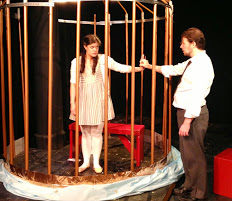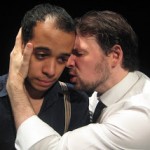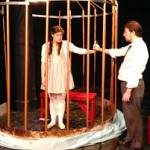By Joel Benjamin
Mein Uncle is subtitled “an absurdist fairytale about the seeds of inhumanity.” Aliza Shane, the author who also directed this production at the Robert Moss Theater, took those words, “absurdist fairytale,” to heart, as an excuse for unsubtle writing, anachronistic behavior and heavy-handed psychology. Although based on historical facts which might have been spun in numerous fascinating ways, Ms. Shane chose to paint with broad strokes. This is a story that deserves keen awareness of human frailty. Ms. Shane’s cliché-ridden and one-note characters made it difficult to comprehend how “the seeds of inhumanity” resulted from this pathological episode.
Adolph Hitler reportedly had an obsessive relationship with the daughter of his half sister, Angela Raubal. His niece, also named Angela, was known as Geli. Her life was tightly controlled by her powerful uncle. Hitler kept her virtually imprisoned until she took her own life—or was murdered—at age 23.
In Ms. Shane’s telling, Geli is literally a bird in a gilded cage, a giant construction from which she never leaves. She is a silly, immature little girl with no personality. Her mother tends to her needs while Uncle Alf (i.e. Hitler) comes in to ogle and speak to her in darkly tender ways, with obvious implications of all-consuming jealousy. We are led to deduce, in this behavior, evidence of Hitler’s growing megalomania, especially after he explodes in a mega-rage at the end of the play, destroying all those that got in his way, including young Emil whom Alf has hired to help him with his writing. Emil discovers Geli in her cage and swiftly becomes enamored. He decides to save her, but faces two insurmountable problems: Uncle Alf’s pathology and Geli’s Stockholm-Syndrome inability to flee.
Placed decoratively around the surreal, metaphorical cage are four beautiful young women who variously act as living bric-a-brac, a Greek chorus and a musical comedy chorus. When any inner turmoil raises its ugly head, these four sing period songs and comment on the action, effectively cutting off any exploration of the inner workings of the characters.
Ms. Shane is a better director than writer. She evinced full-bodied interpretations of her words from her entire cast. The four decorative ladies were Emilie Bienne, Ashley Lovell, Rachel Pfennigwerth and Jennifer Lynn Tune. They are all spectacularly proportioned, wear their sexy black dresses with panache, and move, speak and sing with flair. As the mother Angela, Judy Molner does dour well. She manages to convey fear and longing in her eyes as she looks at Alf, played by Eric Percival whose bad boy good looks make his psychotic behavior even more effective. His rages weren’t totally convincing, but resonated strongly in the small theater. Emil, as written, behaves anachronistically for a young bureaucrat of that era. He disrespects and annoys Alf, something a young German wouldn’t do. Jordon Tierney finds an awkward youthful innocence in the role. Amanda Marikar overdoes the wide-eyed innocent bit in a one-note role that refuses to acknowledge Geli’s physical maturity. Being held in captivity isn’t the same as arrested development.
Mein Uncle illuminates an esoteric, but important moment in time with a 25 Watt bulb, when a hot, bright searchlight was called for.
Mein Uncle (through June 8th)
The Robert Moss Theater – 440 Lafayette St., 3rd Floor (between Astor & E. 4th) New York, NY
Tickets & Information: www.3VTheatre.com Running Time: 90 minutes, no intermission.

























